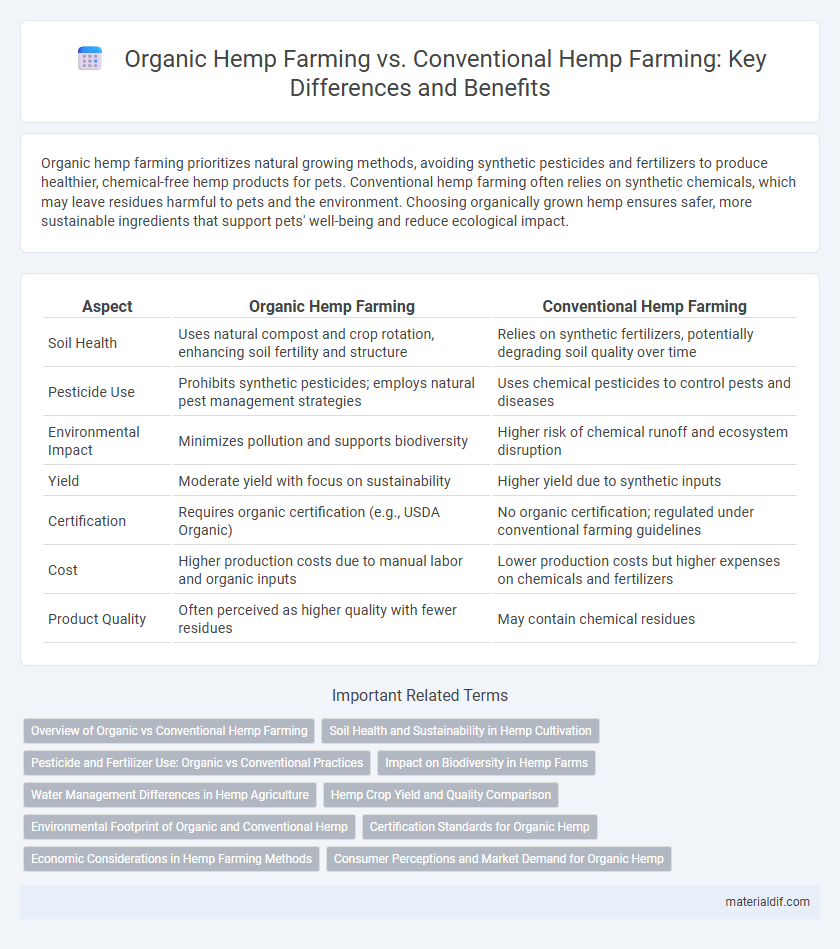Organic hemp farming prioritizes natural growing methods, avoiding synthetic pesticides and fertilizers to produce healthier, chemical-free hemp products for pets. Conventional hemp farming often relies on synthetic chemicals, which may leave residues harmful to pets and the environment. Choosing organically grown hemp ensures safer, more sustainable ingredients that support pets' well-being and reduce ecological impact.
Table of Comparison
| Aspect | Organic Hemp Farming | Conventional Hemp Farming |
|---|---|---|
| Soil Health | Uses natural compost and crop rotation, enhancing soil fertility and structure | Relies on synthetic fertilizers, potentially degrading soil quality over time |
| Pesticide Use | Prohibits synthetic pesticides; employs natural pest management strategies | Uses chemical pesticides to control pests and diseases |
| Environmental Impact | Minimizes pollution and supports biodiversity | Higher risk of chemical runoff and ecosystem disruption |
| Yield | Moderate yield with focus on sustainability | Higher yield due to synthetic inputs |
| Certification | Requires organic certification (e.g., USDA Organic) | No organic certification; regulated under conventional farming guidelines |
| Cost | Higher production costs due to manual labor and organic inputs | Lower production costs but higher expenses on chemicals and fertilizers |
| Product Quality | Often perceived as higher quality with fewer residues | May contain chemical residues |
Overview of Organic vs Conventional Hemp Farming
Organic hemp farming utilizes natural fertilizers, pest controls, and sustainable practices to enhance soil health and reduce environmental impact, avoiding synthetic chemicals. Conventional hemp farming relies on synthetic fertilizers, pesticides, and herbicides to maximize yield and control pests but may contribute to soil degradation and chemical runoff. Organic hemp products often command higher market prices due to consumer demand for eco-friendly and chemical-free goods.
Soil Health and Sustainability in Hemp Cultivation
Organic hemp farming enhances soil health by avoiding synthetic pesticides and fertilizers, promoting biodiversity, and improving soil microbial activity, which leads to better nutrient cycling and soil structure. Conventional hemp farming often relies on chemical inputs that can degrade soil quality, reduce beneficial organisms, and increase the risk of soil erosion and contamination. Sustainable hemp cultivation prioritizes organic practices to maintain long-term soil fertility, reduce environmental impact, and foster resilient agroecosystems.
Pesticide and Fertilizer Use: Organic vs Conventional Practices
Organic hemp farming strictly limits or eliminates synthetic pesticides and fertilizers, relying on natural alternatives like compost, crop rotation, and biological pest control to maintain soil health and pest resistance. Conventional hemp farming often involves synthetic pesticides and chemical fertilizers to maximize yield and control pests, which can lead to soil degradation and pesticide residues in the final product. Studies show organic hemp tends to have lower pesticide residues, promoting safer consumption and environmentally sustainable agriculture.
Impact on Biodiversity in Hemp Farms
Organic hemp farming enhances biodiversity by avoiding synthetic pesticides and fertilizers, promoting a healthier soil microbiome and supporting pollinators such as bees and beneficial insects. Conventional hemp farming relies heavily on chemical inputs that can disrupt ecosystems, reduce soil health, and harm native species. The diversification of plant species in organic hemp fields creates a more resilient environment compared to monoculture practices typical in conventional farming.
Water Management Differences in Hemp Agriculture
Organic hemp farming utilizes sustainable water management techniques such as rainwater harvesting, drip irrigation, and soil moisture monitoring to reduce water consumption and promote better soil health. Conventional hemp farming often relies on extensive irrigation systems that may lead to higher water usage and potential groundwater depletion. Efficient water management in organic hemp cultivation enhances drought resilience and supports environmental conservation compared to conventional practices.
Hemp Crop Yield and Quality Comparison
Organic hemp farming often results in lower crop yields compared to conventional methods due to the absence of synthetic fertilizers and pesticides, which can limit plant growth and pest control. However, organic hemp is frequently praised for superior fiber strength and higher concentrations of beneficial cannabinoids like CBD, reflecting enhanced crop quality. Conventional hemp farming typically achieves higher yields but may produce hemp with lower cannabinoid profiles and potential pesticide residues, impacting overall product quality.
Environmental Footprint of Organic and Conventional Hemp
Organic hemp farming significantly reduces environmental footprint by eliminating synthetic pesticides and fertilizers, leading to improved soil health and decreased water contamination. Conventional hemp farming often relies on chemical inputs that contribute to soil degradation, water pollution, and higher greenhouse gas emissions. Sustainable organic practices promote biodiversity and carbon sequestration, making them more eco-friendly compared to conventional methods.
Certification Standards for Organic Hemp
Organic hemp farming adheres to strict certification standards such as USDA Organic and EU Organic, which prohibit synthetic pesticides, herbicides, and genetically modified organisms (GMOs) to ensure environmentally sustainable cultivation. Conventional hemp farming often allows synthetic inputs and fewer restrictions on chemical usage, leading to differences in soil health, biodiversity, and residue levels in the final product. Certification bodies require comprehensive documentation, regular inspections, and soil testing to maintain organic status, promoting consumer trust and compliance with international organic trade regulations.
Economic Considerations in Hemp Farming Methods
Organic hemp farming typically incurs higher production costs due to the reliance on natural inputs and labor-intensive practices, resulting in premium market prices that appeal to environmentally conscious consumers. Conventional hemp farming benefits from lower input costs and higher yields enabled by synthetic fertilizers and pesticides, leading to increased short-term profitability. Economic sustainability depends on market demand, certification costs, and long-term soil health, influencing profitability and scalability for farmers.
Consumer Perceptions and Market Demand for Organic Hemp
Organic hemp farming is perceived by consumers as a healthier and more environmentally sustainable option compared to conventional methods, which often involve synthetic pesticides and fertilizers. Market demand for organic hemp products has surged due to increasing awareness of ecological impact and desire for chemical-free wellness items. This shift drives premium pricing and encourages growers to adopt organic certifications to meet consumer expectations.
Organic hemp farming vs Conventional hemp farming Infographic

 materialdif.com
materialdif.com